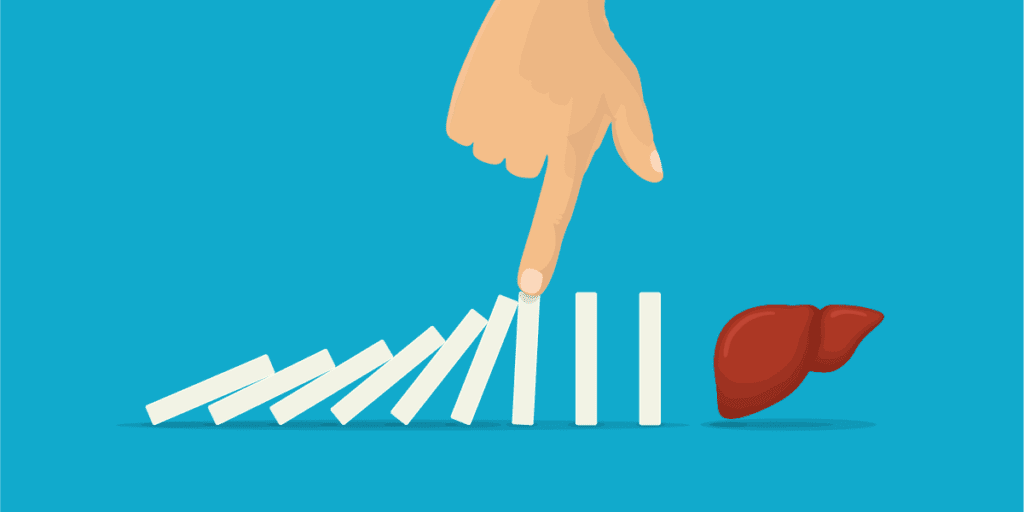Fatty Liver Causes & Prevention
If you’ve ever heard of fatty liver disease, you may wonder what exactly the condition is. It’s pretty much exactly what it sounds like: it’s a condition that occurs when your liver, the largest organ in your body, becomes overly fatty.
The liver plays an important role in your overall health. It is responsible for helping the body digest food, storing energy from what you eat and removing poisons. When your liver is functioning optimally, you likely don’t think about it much. But when it isn’t operating well, harmful substances can build up in the body, causing a variety of unpleasant and even debilitating symptoms.
Fatty liver disease is one condition that can disrupt your liver’s normal function. There are two main types of fatty liver disease—alcoholic fatty liver disease and non-alcoholic fatty liver disease.
What Causes a Fatty Liver?
Causes of a fatty liver vary depending on the type of fatty liver disease involved.
Alcoholic fatty liver disease is caused by heavy alcohol intake. Your liver is responsible for breaking down any alcoholic beverages you drink. When you drink only a moderate amount, this process is typically harmless, but during the process of breaking down alcohol, harmful substances can be released into the body. These substances damage liver cells and promote inflammation in the liver, damaging its ability to function properly.
Non-alcoholic fatty liver disease, on the other hand, is unrelated to alcohol intake. The cause of this type of fatty liver is unknown, but some factors increase your risk of developing the condition. These risk factors include:
- Being middle-aged or older
- Being obese
- Being of Hispanic ethnicity
- Having high blood pressure
- Having high cholesterol or triglycerides
- Having metabolic syndrome
- Having prediabetes or diabetes
- Taking certain medications, such as corticosteroids
Many of these risk factors are tied with lifestyle habits, so can be mitigated with healthy habits. Exercising regularly, eating a balanced diet, and getting to and maintaining a healthy weight are steps in the right direction.
How Dangerous Is Non-Alcoholic Fatty Liver Disease?
This largely depends on the type of non-alcoholic fatty liver disease you’re diagnosed with. There are two main types: simple fatty liver and nonalcoholic steatohepatitis, also called NASH.
Simple fatty liver is diagnosed when there is fat in the liver but very little inflammation. It typically will not cause liver damage or complications.
NASH, on the other hand, causes inflammation and liver damage. These effects can cause liver scarring and increases the risk of developing cirrhosis and liver cancer.
What are the Stages of Fatty Liver Disease?
Fatty liver disease typically doesn’t cause noticeable symptoms, so it is usually diagnosed after abnormal liver test results. During a medical evaluation, your doctor will consult your medical history and perform a physical exam, looking for signs of cirrhosis, such as jaundice, as well as signs of an enlarged liver.
If your doctor believes you have fatty liver disease, additional tests will be ordered to determine which of the fatty liver stages you’re in. One such test, known as FibroScan, uses a type of imaging called liver elastography to scan the liver for scarring, which is known as fibrosis. FibroScan can determine whether scarring is present and the extent of the damage.
Because FibroScan is noninvasive, it is often used as an alternative to biopsy, which requires the removal of a piece of the liver for testing.
Can Fatty Liver Disease Be Reversed?
While you can’t reverse existing fibrosis, you can “halt” fatty liver disease by taking steps to prevent future damage. Practicing healthy lifestyle habits, including regular exercise and a healthy diet, can help reduce the amount of fat in the liver and limit future scarring and damage to your liver.
This can help keep fibrosis from developing into cirrhosis or liver cancer. Along with lifestyle changes, your doctor may also prescribe medications and recommend not drinking alcohol or using illegal drugs.
Learn more about FibroScan and how it can help detect fatty liver disease. American Health Imaging offers FibroScan and other imaging services in multiple locations for your convenience.
